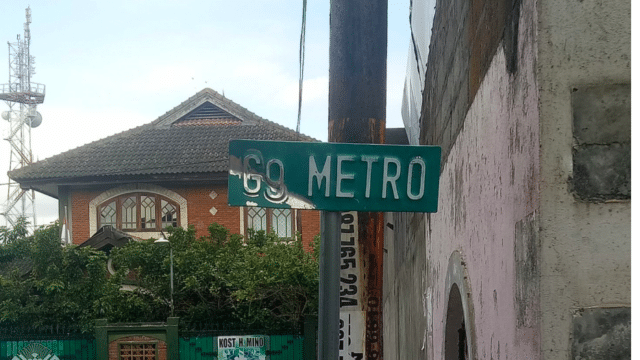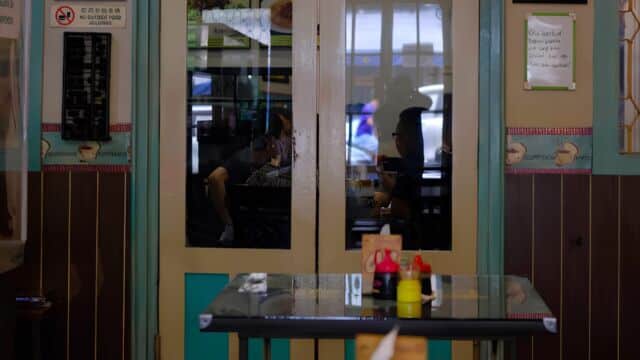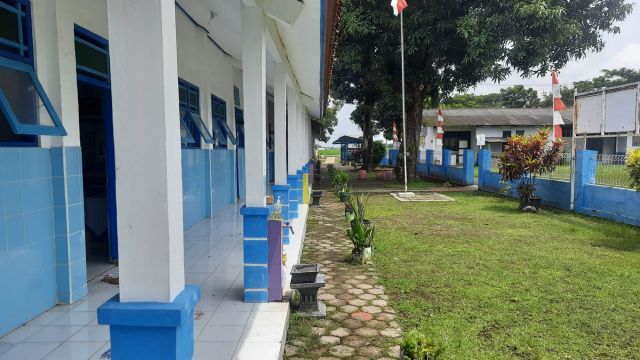A Pancake Breakfast by the Sea
Kue cubit, a similar snack. Photo: Pradamas Gifarry/Unsplash.
A stall selling serabi | 2,000 words | Translated from Bahasa Indonesia by Sarah Leys
Ampenan Beach is usually quiet in the morning, so it’s the perfect time to hunt down a warm breakfast: serabi, an Indonesian pancake made using coconut, and lupis, a sweet cake of sticky rice.
I’m a regular at a stall close to the ceremonial archway that marks the entrance to Ampenan’s old city. I go there when I’m too lazy to make my own breakfast at weekends, or when I’m needing inspiration. The serabi aren’t merely made fresh – on a clay pot stove – the moment an order is placed, they’re also bigger than those sold elsewhere. And the lupis there is legit, something to long for. The lady who runs the stall uses the very best sticky rice: she doesn’t mix in regular rice like so many other sellers do. Not to mention the treacly palm sugar sauce, its deliciousness pouring over the gratings of fresh coconut.
For just 5,000 rupiah (35 cents) per portion, I get to eat a delicious breakfast on the edge of the sea while I listen to the waves or read a novel. A small happiness and a small luxury after the fatigue of full-time teaching from Monday to Friday.
Another plus, I can observe life going past. Women holding hands with husbands. Children running on the beach’s black sand. Men fishing from atop large boulders next to the ocean. Sometimes a couple fighting.
To get to Ampenan from Sandik, a hamlet five kilometres away and slightly inland, I ride a scooter.
This morning I rev my new white Honda Scoopy, whose name is Shadowfax. The engine gives a gentle roar, and I appraise it full of affection. I’m a fan of Lord of the Rings, and it feels very appropriate to give such a heroic name, the name of the magical horse in the trilogy, to this bike. Sometimes – if people aren’t around – I say, ‘Hello Shadowfax my love, are you ready for adventure?’
The dough begins to hiss and there are small bursts of fire, then the clay pot’s lid goes on.
‘How long have you been doing this?’ I ask.
‘A long time, child’.
The journey takes around 15 minutes by motorbike. I pass the tidily-maintained Chinese cemetery in Bintaro, the graves interspersed with grasses, bushes and trees. Approaching the Bintaro fish market, several cidomo, horse-drawn carts, are in front of me, so I have to slow down. Because of this I look longer at the disorderly, crowded fishmongers offering mackerel, grouper, and tuna of up to a meter long. At the market’s edge traders are cutting some of the huge tuna into pieces with high skill, turning the fish into heads, long fillets, and skeletons. With bored, indifferent faces they push the bones off the tables to the floor, where thin cats are already waiting and meowing unceasingly. Atop the tables the fish heads are still dripping blood, and flies are gathering. A fishy smell assaults my nose without forgiveness, and I hope the cidomos will move faster.
After the fish-market, I arrive at Ampenan’s five-road intersection. The ceremonial archway stands proud and tall. Before veering right, I pray. I pray that not many people are queuing at my regular pancake stall. Passing under the archway, I see my prayers have not been answered. A long queue, with motorbikes and cars parked all around, waits by the vendor. I’m late.
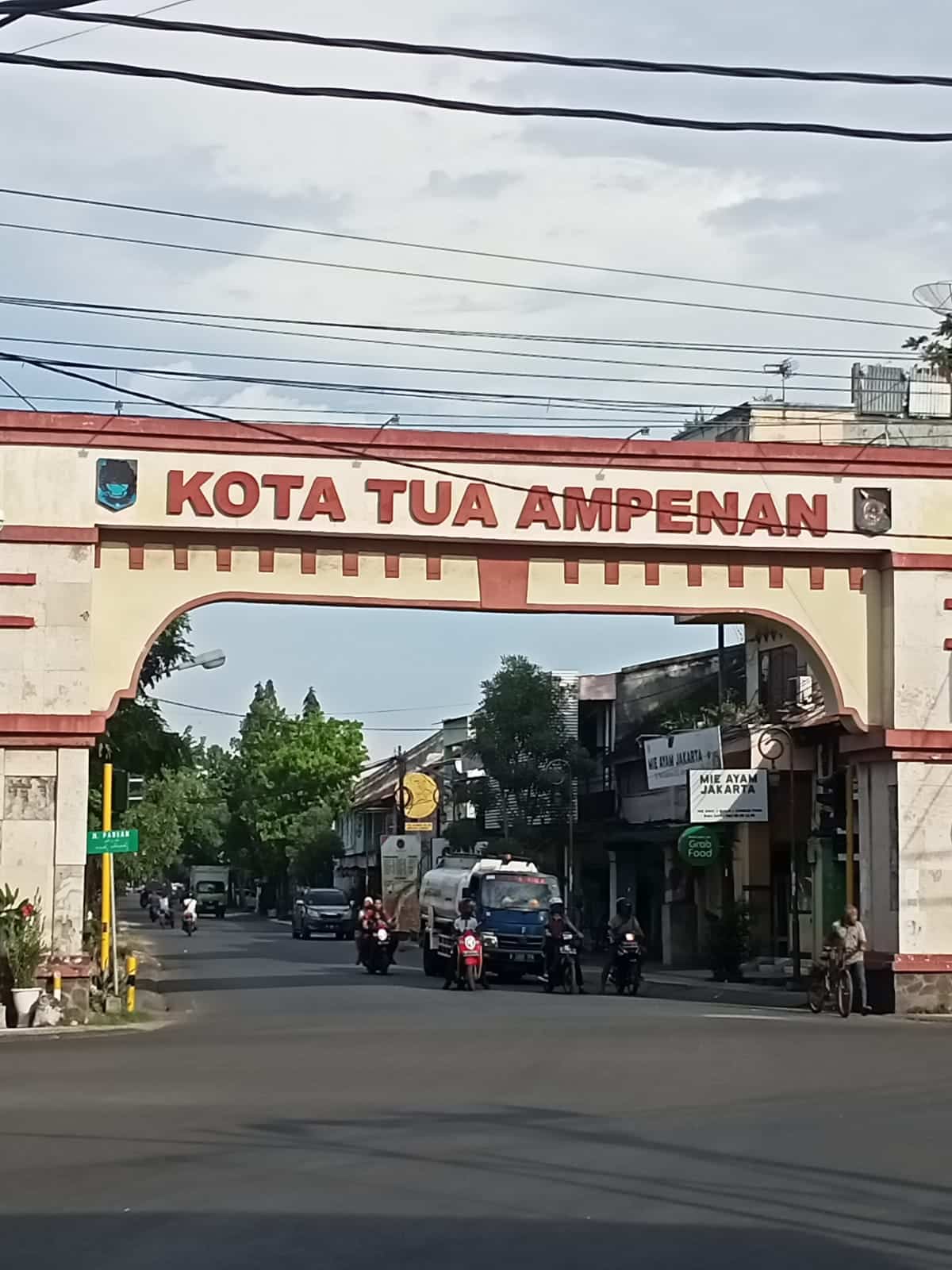
Even though I left the house at seven o’clock, I should have remembered that there are more customers at the end of the week. Ideally I would have left at six o’clock. But because I wake up before six almost every workday, and collapse in a heap upon coming home, I feel I have the right to enjoy the small indulgence of a sleep-in on weekends. My sister, who occasionally video calls and teases me over how quickly I get tired and how rarely I leave the house, puts these things down to the ‘A-factor’, age. Damn: even from far away she can make me feel past my prime.
A thunder-like rumble sounds in my stomach. Feeling a little sick at the sight of the queue, I park my scooter in the one and only spot left. The serabi lady’s stall has what I think of as a VIP area, a small wooden bench that fits two people and is right in front of her. Like similar spots in similar food stalls, sitting there makes possible faster service. Vendors at such stores are usually quicker to serve people sitting directly before them, not always being overly fussed with queues. There’s also a better chance of asking for additional palm sugar sauce. Heaven.
But of course, two people are already sitting there – plus six others waiting. I stand behind a Chinese-Indonesian woman. She glances in my direction. Maybe a smell of fish has stuck to my clothes. But soon she busies herself with her phone.
‘It’s busy, hey, Bu’, I say, attempting small-talk. Because of my long teaching hours, sometimes I feel that I spend most of my time with small children at the school. Our discussions there often revolve around who’s rostered to clean the cage of Hamster Bieber, our class pet, or the best way to hold onto erasers and pencil sharpeners so they don’t disappear every second. There are times when I miss discussions with other adults outside of school.
She looks at me for a second. ‘Yeah’, she answers, then returns to her phone. Seems she doesn’t want to chat. Suddenly my stomach makes another loud rumbling, and I have to pretend to cough to hide it. Almost everyone in the queue is busy scrolling or tapping away on their phones.
I look at the serabi lady while daydreaming about what I might do with the rest of my day. Writing some poetry would be good – although I’m remembering that my fridge is almost empty.
Once a week I shop for vegetables at Kebon Roek traditional market, also in Ampenan. I don’t love shopping at those sorts of places, especially Kebon Roek which is typically puddled and slimy and always hectic, so hectic that merely walking makes me bump and brush against lots of people’s shoulders. Then there’s the matter of parking my scooter there. Ugh – head-spinning. It’s like the parking lot attendants have a sixth sense that allows them to disappear whenever someone needs assistance getting their bike out. But miraculously, after I do it all myself, made seriously out of breath, they appear again, blow their whistle right next to my ear, then stroll off casually, ‘forgetting’ to give back my change. Leaving me still gasping for air and sweating, eyes wide and mouth gaping from my endeavours to release Shadowfax. And at risk of going deaf from those whistles.
My daydream proceeds apace, with me imagining doing my weekly food shopping at a more ideal place. A place that’s cleaner, drier, and pleasant-smelling, with cold AC. And parking attendants who are friendly, accommodating, and diligent about personal hygiene. But what can you do, the contents of my wallet can only get me to the slimy, puddled traditional market, not the glittering malls in the city centre.
Perhaps I’ve daydreamed more than I think, because the queue is now much shorter and a spot on the VIP bench has opened up! Fast as lightning, I sit down. I don’t think I’ve ever moved that fast – but it seems the serabi lady is still busy with existing orders.
Her age is maybe not so far away from my mother’s, likely in her 60s. Adroitly she hoists from the two large clay pot stoves in front of her serabis that are already done, using a spoon that’s been pressed thinner to better handle them. Steam emanates from each just-cooked pancake, and I find myself salivating. Next to her sits her daughter, expertly opening up banana leaves containing delectable lupis – they too have just been cooked, whilst wrapped inside the leaves, atop the stove. If I were a cat, I think to myself, I would be meowing in impatience now. Thank God, soon it’s my turn. The Indonesian-Chinese lady has taken her order and is entering her car.
‘Are there still serabi, Bik?’ I ask anxiously. While thinking that my journey from Sandik to Ampenan and my queueing up will be for nothing if she’s sold out. This lady usually only prepares two medium-size buckets of dough, which get emptied fast on busy weekends like this.
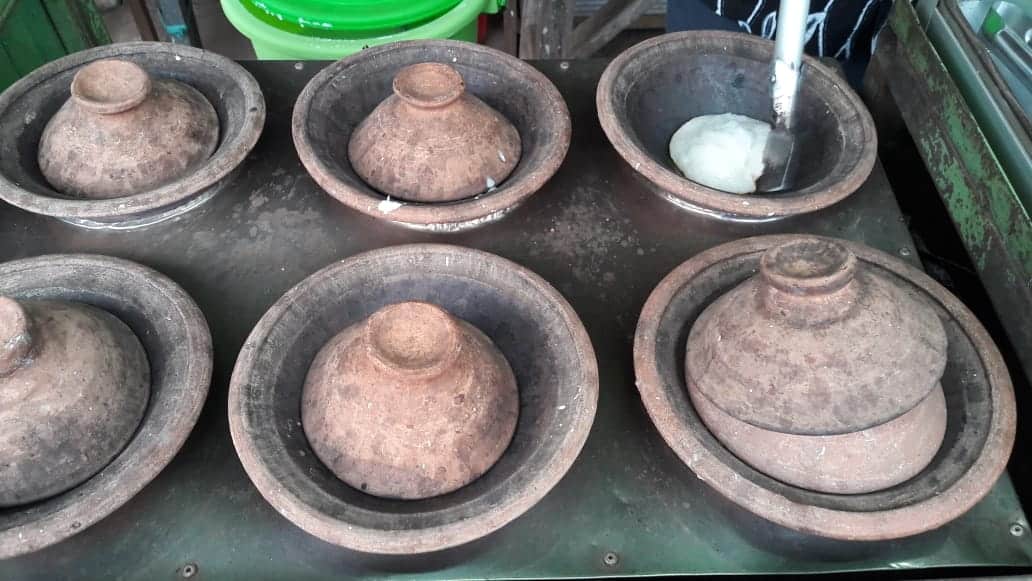
She gives a friendly laugh.
‘Don’t worry, we’ve still got some. But wait a minute, okay? I need more dough’. I nod rapidly. She takes an iron ladle and stirs the dough which is already beginning to settle at the bottom of the plastic tub. I see veins on the back of her hand bulging, though her skin itself is smooth. She pours the white dough into several pancake-shaped moulds in a pan sitting above the stovetop. The dough begins to hiss and there are small bursts of fire, then the clay pot’s lid goes on. The lady looks at the wood burning underneath, making sure the flame is at the right level.
‘How long have you been doing this?’ I ask casually.
‘A long time, child’. She’s cleaning an empty pancake mould on top of her second stove. ‘More than fifteen years’. Smoke from the stove reaches her face, and she waves it away with her hand. Referred to as ‘child’, I’m immediately a teenager again.
‘Wow, that’s a long time, Bik. So you like it, I guess, if you’ve been doing it for fifteen years?’
‘Well, it pays the bills, child. Making serabi and lupis are the only things I can do’. She opens the stove’s lid, checks the pancakes, closes it again.
Then she has a question for me: ‘Are you married, child?’
I shift in my seat. Here, marriage status is not considered a private matter. Asking this question is considered no more intimate than asking ‘have you eaten?’
I answer, ‘I have been married’.
She nods at this.
‘Children?’
Now it’s my turn to nod. ‘One’. She looks up at me.
‘How come just one? If you go ahead and have children, you should have at least four of them’. This sentence is unleashed barrage-like, while she chuckles.
‘Why should you have four, Bik?’ Now I lean forward and help her remove a piece of banana leaf stuck to a lupis.
‘If you have four children, one can help you sell, one can clean the house and wash dishes, and one can give you a massage if you’re tired’.
I laugh. ‘And the fourth?’
‘To search for firewood to feed the stove’ – now she laughs, too. Her daughter glances over at us but doesn’t say anything, continues to grate coconut.
‘Do you like selling serabis?’ I’m asking a second time. She smiles.
‘It’s work, child. It needs to be done whether you like it or not. The important things are, does it let you and your children eat, and is it halal?’ The pancake is ready. She skilfully levers the white-brown pancakes onto an iron tray.
I’m struck. How often have I imagined pursuing a new field of work, other than teaching, because I’m feeling restless after several years? Meanwhile in front of me sits this lady who’s been operating a stove which runs on wood for more than fifteen years. Over that time she must have flipped thousands of pancakes, grated hundreds of coconuts, and she is grateful for it. Silently I look over towards the beach.
All along the road to the sea, on both left and right, are old buildings with Dutch architecture – as if they’ve been left-behind. Silent witnesses that Ampenan was once a shining centre of trade and shipping. Now the buildings house bread shops, fishing shops, beauty salons, and chicken noodle eateries. On some walls, paint is peeling. The high windows on the upper floors are always shut, making me wonder – or suspect – what lies inside.
My order’s ready, neatly-wrapped in banana leaf. Grasping it, my fingers become warm. I switch on my scooter’s ignition and head for the beach. To the right is a Confucian temple, enlivened by the colour red. Pao Hwa Kong temple is estimated to be about 120 years old. A wind coming from the beach gently moves the red, bright, hanging paper lanterns, as if they’re graceful waltzers. At first I’d assumed the paper lanterns only appeared at particular times, but then I realised they’re here year-round. It’s like their glowing lights balance the gloominess of the old Dutch buildings.
I sit on a bamboo chair in front of the sea, look around, then taste the serabi and lupis. The seafood warung restaurants that line the beach aren’t open yet.
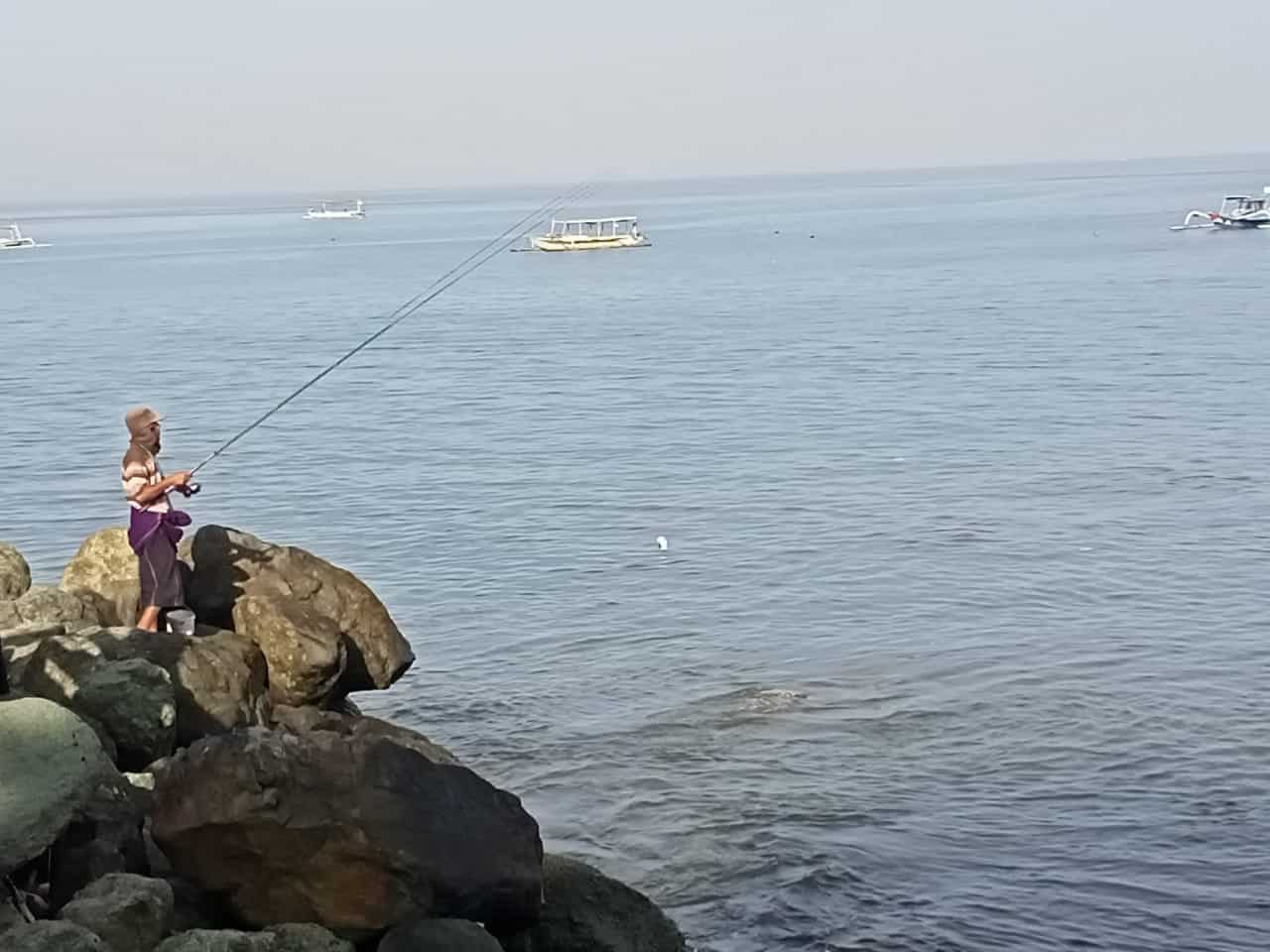
On the black sand, a father wearing a hat accompanies his son, who is busy making drawings of the big ships at the edge of the port. A large glass of tea sits next to the man, which he and his child take turns drinking from, the child laughing happily and pointing at the ships.
The serabi stall is already quiet, but my discussion with the lady there is still echoing in my mind.
Kebon Roek market can wait until tomorrow.
© Julia Arungan
English translation © Sarah Leys




